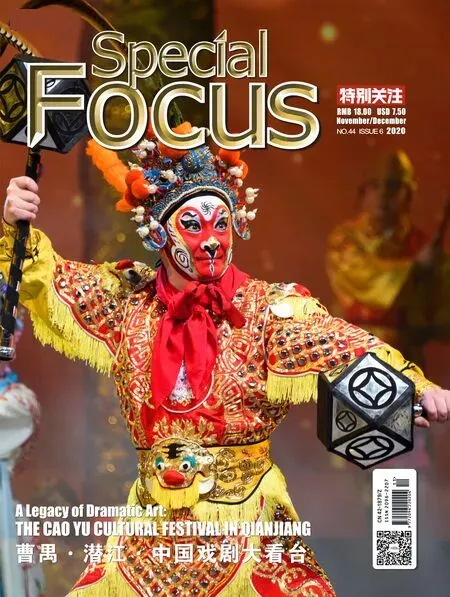洁
By Bai Yujie & Zou Xinsheng
There are few things more magical than looking out of the window and discovering those first snowflakes gently falling to the ground in the cold of winter. As the world outside is blanketed in frosty, white powder, I pull the warm blankets closer to my chin as I begin to relax and unwind to the company of a good book, enveloped in a cozy, dreamy cocoon.
The Chinese character 洁(jié) conjures up images of all those bygone white winters.
Tracing the origins and etymology of Chinese characters is a common occurrence due to the nature of the Chinese language. As bizarre as it may seem, the Chinese character洁could not be found in any ancient historical document or dictionary, but a search did find its ancient ancestor 潔(jié). Actually,洁 and 潔 were initially two different characters. The original pronunciation of 洁 was jí, which is the name of a river. However, 潔 has a history of more than 2,000 years, first appearing in the Spring and Autumn Period (770-221BC). In terms of structure, 潔(洁) is a pictophonetic character composed of two parts: the left part 氵is the radical, meaning something or some actions related to water. The original character 絜 (jié), consists of three components: 丰 (dense), 刀 (knife), 糸 (silk), and indicates that thick 丯 cloth 糸is trimmed “neatly” with a knife (刀). Later the water radical was added for greater clarity.
As part of an effort to make Chinese characters easier to learn and write, simplified Chinese characters were adopted to supplant their tranditional counterparts. And thus 洁 gradually replaced 潔, becoming the standard in schools and Chinese society at large.
It is common knowledge that any language is an indispensable tool for human communication. And the Chinese language is an exemplary case of social institutions and changes, which invites us to appreciate the most enduring cultural heritage of China. Characters not only have an original meaning, but also many extensions and expansions. When 洁 is used as an adjective, it means “clean, white, organized, holy, pure, jade, pithy, and noble.” When used as a noun, it has the meaning of “spotlessness, sanitation, neatness, purity and virtue.” However, when used as a verb, it means “to clean” and has the implication of making one’s behavior noble and refined, too. As early as pre-Qin Dynasty, a book namedGuanzi《管子》(a collection of the opinions of various schools of thought) first stated 鲜而不垢,洁也(xiān ér bù gòu, jié yě), revealing that the earliest usage of 洁 was to modify “something spotlessly clean and unbesmirched.” However, with the passage of time the meaning of 洁 was gradually extended. For example, in theAnalects, Confucius said, 与其洁也,不保其往也 (yǔ qí jié yě, bù bǎo qí wǎng yě), which means, “Encourage people to keep themselves clean and not to dwell on past shortcomings.” Here the meaning of purity was expressed for the first time. The phrase 宁廉洁正直以自清兮(nìng lián jié zhèng zhí yǐ zì qīng xī) is from a poem written by Qu Yuan (340-278 BC), a renowned poet who lived during the Warring States Period, and means that he would rather remain clean by keeping to his principles to convey his moral integrity and impassioned spirit than surrender, an attitude which has been admired by Chinese people throughout the ages. Since then, the character 洁 has taken on the primary meaning of good virtue, moral integrity, and unbending uprightness. More amazingly, a phrase 修身洁行(xiū shēn jié xíng; preserve one’s purity and integrity through self-discipline) fromRecords of the Historian《史记》(the first history book in China), further reflects the deep connection between 洁 and moral cultivation. The same story is also cited in the writings of subsequent generations.
The character 洁 is popular and favored by contemporary Chinese society. For example, words such as 高洁(gāojié, nobleness), 廉洁(liánjié, incorruptibility), 纯洁(chúnjié, pure), 圣洁(shèngjié, holy), 贞洁(zhēnjié, chaste), 洁白(jiébái, immaculate), 洁行(jiéxíng, righteousness), 洁操(jiécāo, ethicality), 洁矩(jiéjǔ, lawabiding), 洁志(jiézhì, nobleminded) are widely employed in formal publications as well as daily usage. This is an expression of the people’s pursuit of good virtues and yearning for an elevated life. No doubt many parents in China are fond of naming their daughters 洁, which carries a similar connotation to the “vestal and pure” one in English. As a girl’s name, this character conveys all the beautiful expectations and longings of loving parents.
Integrity, incorruptibility and lofty morality are highly valued in Chinese society, and governments are fighting against corruption to promote a social atmosphere of moral integrity, thus creating a happy, peaceful and harmonious living community.
December is the month when Christmas is celebrated, and is a time when clean white snow often blankets the ground in many places. A great match to the scene is the lyrics of the song “Edelweiss” from the Hollywood filmThe Sound of Music:
Edelweiss, edelweiss
Every morning you greet me
Small and white
Clean and bright
You look happy to meet me!
It sings quite fittingly of the clean and white season which the character 洁 embodies. And I sincerely wish the troubled world to be pure as jade and clean as ice.

